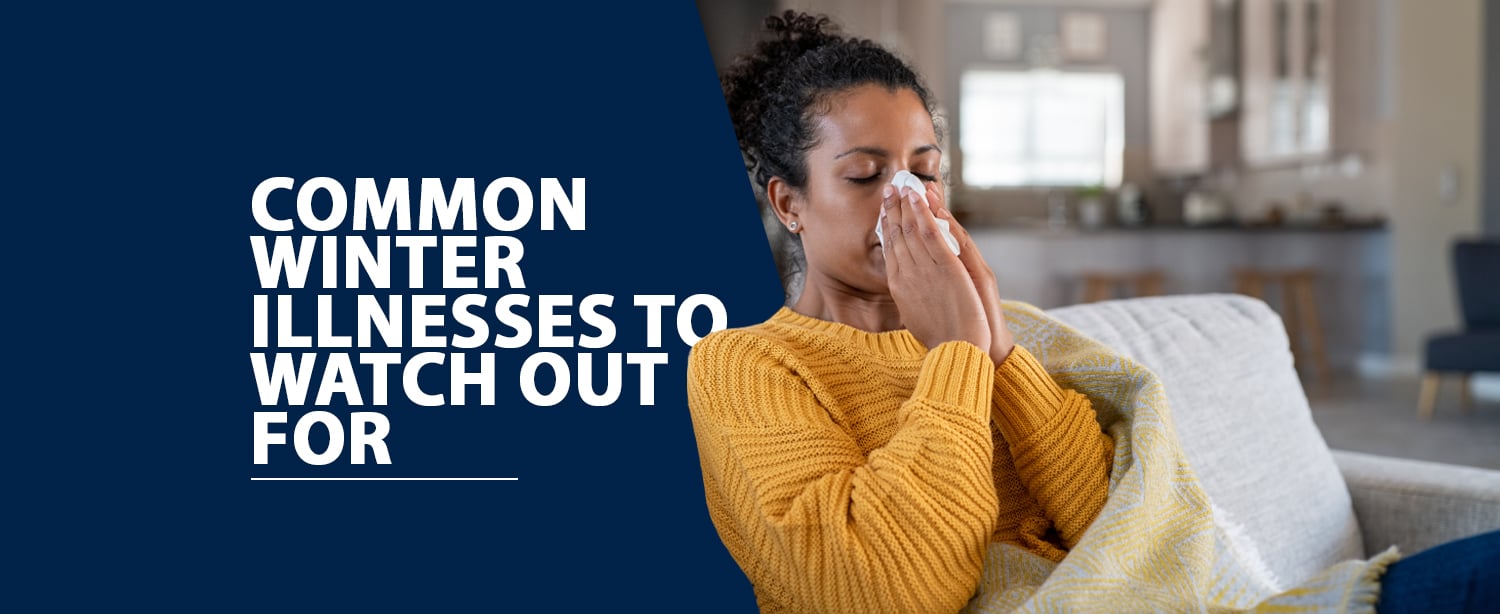Are you happy and excited for the winter season and look forward to don your warm clothes? However the winter season may not be as pleasant for all. The colder temperature and the dryness in the weather can impact people’s health adversely and increase their risk of falling ill. The elderly and young children are more susceptible to seasonal winter infections. Let’s look at some of the most prevalent wintertime seasonal ailments that affect the community and understand their preventive measures:
- Gastroenteritis and norovirus
Nausea, vomiting, and diarrhoea are symptoms of these acute stomach infections. There are several causes of gastroenteritis, including viruses, bacteria, and parasites. The main sources of transmission for this condition are person-to-person contact and contaminated food and water.
Prevention – It is best to drink boiled water and maintain high hygiene while preparing and storing food. - Bronchitis
Acute bronchitis, an inflammation of the bronchial tubes, the airways between the mouth, nose, and lungs, is seen more often in the winter. The most typical sign of bronchitis is a hacking cough that, after a few days, may produce mucus. The majority of people will recover in seven to ten days with the help of medications and rest.
Prevention – You must follow a healthy lifestyle, maintain high hygiene levels and stay hydrated. - Common cold
The winter season is when the ever-present “cold” is at its height. A sore throat, stuffy and runny nose, and a mild to moderate cough are the hallmarks of the common cold, a respiratory infection. Runny nose, congestion, sore throat, coughing, sneezing, moderate headache and body aches, lethargy, and low-grade fever are a few of the symptoms.
Prevention – It is best to eat home cooked food, avoid meeting sick people and wash your hands regularly. - Pneumonia
A potentially fatal condition known as pneumonia is caused when bacterial and viral infections spread throughout the alveoli, or small air sacs in the lungs, and fill them with fluid. Therefore, those who have pneumonia have shortness of breath. Coughing, sneezing, or touching infected objects and then touching your mouth or nose right away can spread the bacteria that cause pneumonia. Chest pain, chills, a high temperature, quick and heavy breathing, and a cough with yellow or green mucus are a few of the signs of pneumonia. In some cases, pneumonia can be extremely serious and even fatal if not treated promptly.
Prevention – You must wash your hands often, exercise regularly, eat healthy and quit smoking. - Dry skin conditions
It is among the most prevalent issues encountered throughout the winter. Conditions such as eczema and psoriasis also aggravate in winters and cause extreme dryness, cracked skin, bleeding, discomfort, etc.
Prevention – It is advisable to prevent hot water baths, moisturize frequently to keep the skin moist. - Joint pain
The majority of arthritis patients experience pain and discomfort during the cold winter months. Wear warm clothing to keep your body warm and exercise during the winter.
Prevention – Regular exercise, wearing warm clothes and hot water bags can help reduce the occurrence of such pains. - Asthma and allergies
Winter might be the most challenging season of the year for people with asthma. Your airways might become irritated by cold, dry air and abrupt changes in the weather, which can create more mucus. People who already have allergies may experience worse symptoms in the winter. Or, some individuals who are allergic to the dust mites may experience additional symptoms such as an itchy nose, watery eyes, clear mucus, and nasal congestion.
Prevention – Stay away from triggers and keep yourself warm to reduce asthma attacks and allergies.
Hand washing frequently is the first step in lowering the risk of contracting several common illnesses throughout the winter. Apart from that you must eat healthy, exercise regularly and sleep well too to strengthen your immune system and reduce the risk of illness. If you are suffering from any of the above conditions, get in touch with our health experts for further care. Call us on 022 42696969 for appointments or visit the below website: https://www.kokilabenhospital.com


